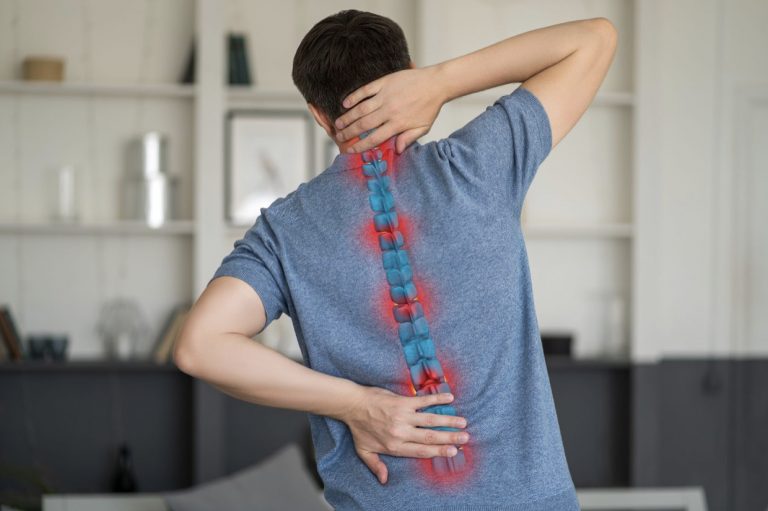Many people who experience neck pain, back pain, leg pain, and other symptoms describe the source of pain as a “slipped disc.” Although this is a common term that is even used by many doctors, it does not represent an official diagnosis. Instead, it generally describes a number of specific spine conditions that can include bulging discs, herniated discs, or spondylolisthesis, which is a condition where a vertebra and disc slips out of its normal position in the spine.
Essentially, slipped disc is a term that describes a disc or disc material becoming displaced or slipping out of its normal place in the spinal column. These conditions may not result in causing a patient to feel pain and other symptoms. However, if a slipped disc causes compression or irritation of the spinal nerves, debilitating symptoms can result.
To learn more about how disc conditions that are called slipped discs develop, take some time to review the following easy-to-understand information. The BEST Health System team is here to help and we welcome you to reach out to us with any questions.
Understanding the spinal discs and disc conditions
In the spinal column, the discs are rubbery cushions that sit between the vertebrae and basically act as shock absorbers. This allows us to bend and flex, while still enabling the spine to support the upper body and protect the spinal cord. There are discs in each of the three regions of the spine, but the discs in the middle or thoracic, region undergo the least amount of stress because this area is fixed to the ribcage.
This means the cervical (upper) and lumbar (lower) discs undergo the most stress and are most prone to injury and age-related breakdown. Over time, our discs dry out and become brittle, causing bulging and tiny tears that can lead to herniation.
How a slipped disc can affect the spinal nerves and cause symptoms
As mentioned above, age-related disc degeneration does not necessarily cause symptoms, but it can cause you to feel pain if it disrupts spinal nerves by narrowing the spinal column. The symptoms can vary by location in the following ways:
- Cervical slipped discs: Disc conditions in the upper spine cause neck pain as well as radiating symptoms in the upper extremities, including the arms and hands.
- Thoracic slipped discs: Although relatively uncommon, disc conditions here cause middle back pain as well as potential symptoms in the chest and abdominal regions.
- Lumbar slipped discs: Disc conditions in the lower spine can cause lower back pain, leg pain, tingling, numbness, and muscle weakness in the lower body.
How to find relief from a slipped disc
In many cases, basic treatments are very effective for slipped disc relief. Doctors may recommend the following after diagnosing disc conditions:
- Rest
- Gentle stretches and low-impact exercise
- Over-the-counter medication such as acetaminophen or ibuprofen
- Hot and/or cold therapy
- Physical therapy
- Pain-relieving steroid injections
It’s also important to practice a spine-healthy lifestyle that includes regular exercise, good nutrition, proper posture, and mechanics to reduce the amount of stress on our discs. This can help to relieve a slipped disc that has already developed. It may also help with prevention.
By committing to a healthy lifestyle and conservative treatment, many patients are able to successfully manage a slipped disc.
When to consider spine surgery
Spinal disc conditions called slipped discs, including bulging discs, herniated discs, and spondylolisthesis, often respond well to nonsurgical treatment. However, if weeks or months of attempting nonsurgical treatments do not bring relief and better quality of life, surgery should become a consideration.
If there is an operable condition that is causing nerve compression, surgeons can perform procedures to remove disc material from the affected nerve. In other situations, if disc slippage or injury is causing spinal instability, a stabilization procedure, also called a fusion, can help to stabilize the spine.
At the state-of-the-art facilities at BEST Health System, our world-class surgeons can treat a wide range of disc conditions using minimally invasive spine surgery. These outpatient procedures are associated with less risk of complication and a shorter recovery period compared to traditional open spine surgery.
Our multidisciplinary team can also help you create a personalized treatment plan that includes spinal injections if you are still exploring initial therapy. We’re dedicated to helping you overcome slipped disc pain so you can get back to the people and activities you love.
Contact us today to learn more.
